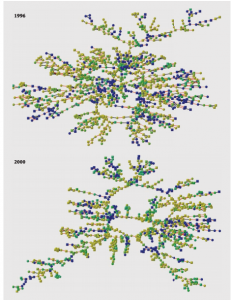Social Networks and the Diffusion of Happiness
While we know that information can spread through networks, such as information about jobs or contact information, can these be extended to emotional states? James H Fowler and Nicholas A Christakis attempt to explore this question in their research described in their paper Dynamic spread of happiness in a large social network: longitudinal analysis over 20 years in the Framingham Heart Study published to the BMJ medical journal. Their study found that happiness is diffused through social networks , with a person being 15.3% more likely to self-report themselves as happy if they are directly connected to another friend who self-reports as being happy.
The image above included in the study represents nodes with yellow as being happiest, blue as least happy, and green a medium amount of happiness.
One important observation that Fowler and Christakis found was that the better connected are an individuals’ friends and family, the more likely they will attain a high level of happiness in the future. They also found that the more closely a friend is to another geographically also has a larger affect on whether the happiness is transferred.
This study ties closely into the ways in which social networks work and the ways in which individuals interact on a large scale. This study really helps us to think about the ways in which social interactions and the role of just one individual node can have on a large extensive group of people.
Source: http://www.bmj.com/content/bmj/337/bmj.a2338.full.pdf

